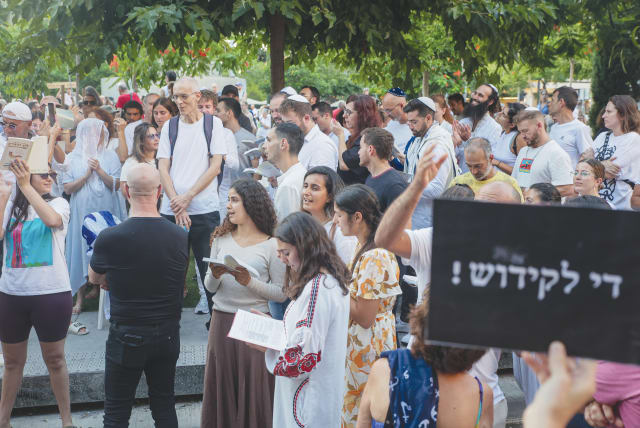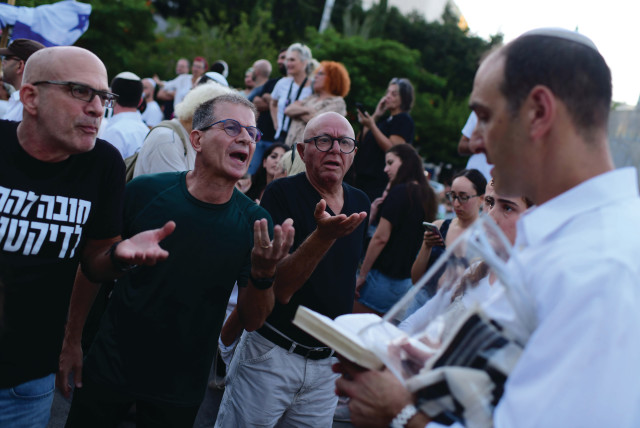Were the Yom Kippur prayer protests Israel's January 6th? - opinion

In storming the Capitol, their democratic temple, hundreds of Americans crossed once inconceivable lines. On Yom Kippur, secular zealots stormed Israelis’ holiest “sanctuary of time.”
Historical analogizing is tricky. Too many right-wingers have sloppily deemed some Tel Avivians’ monstrous yet bloodless Yom Kippur assaults on fellow Tel Avivians, “pogroms.” Such ahistorical hyperbole minimizes how violent those 19th-century riots were and how powerless Eastern Europe’s Jews were.
Instead, the Yom Kippur thuggery felt like Israel’s January 6th. To escape our ever-escalating political insanity, let’s learn the lessons too many Americans failed to learn in 2021: beware fanaticism, protest peacefully, politic honestly, and police your own side’s excesses first.
In storming the Capitol, their democratic temple, hundreds of Americans crossed once inconceivable lines, which explains why the building wasn’t better protected. On Yom Kippur, secular zealots stormed Israelis’ holiest “sanctuary of time,” as Abraham Joshua Heschel profoundly phrased it. Who would have imagined that, on Israel’s national holy day of reverence and calm, dozens of illiberal liberals would profane our temporal temple – seizing prayer books and menacing innocent worshipers, including many terrified children, who just wanted to pray?
Something about today’s social-media-fueled, algorithm-inflamed politics keeps turning dull normies into rabid beasts shouting “my-way-or-the-highway” and the “sky-is-falling.” I keep reading the confessions of lifelong law-abiding Americans who believed Donald Trump’s election fraud lies so fervently, they invaded the Capitol, blowing up their lives. They, too, felt “provoked;” that green light politically-inflamed thugs give themselves to cross red lines. It’s the lowest order of moral reasoning – playpen-level. You blame others for your actions.
You cry “provocation,” I hear: “dodging personal responsibility while rationalizing your friends’ sins.”
Similarly, I wonder about the psychopathology of some grandparent waking up on Yom Kippur, and rather than contemplating life or enjoying family time, deciding to scream, berate, and bully fellow Jews. These undemocratic mobocrats succumbed to IBS (irritable Ben-Gvir Syndrome) – when your opponents’ boorishness so exasperates you, you imitate it.
AS A HISTORIAN, I acknowledge the underlying causes. They include Benjamin Netanyahu’s decade-long divisive demagoguing; rogue Religious Zionist barn-burners forgetting their traditional role as bridge-builders; and Rosh Yehudi’s weaponizing of prayer and gender-dividers. But none of these triggers justifies any individual’s hooliganism morally or legally. You just don’t harass innocents trying to pray in the first Hebrew city, in the only Jewish state, on the Jewish people’s holiest day.
As some leftists sputter, “but Rosh Yehudi defied the court,” their sudden conversion to vigilantism disgusts me. The police enforce the law, not mobs. As an Israeli, a Zionist, and a civil libertarian, I am embarrassed that any Israeli jurisdiction bans gender segregation in prayer in municipal spaces.
Such laws are obviously anti-Jewish, targeting traditional Jewish prayer. Denying the intent and effect would be like some European bureaucrats outlawing straight blades when slaughtering beef – then feigning surprise that the prohibition banned kashrut. If a fair international human rights system existed, that wasn’t anti-Israel, I would sue Tel Aviv’s municipal bigots there.
Both extremes in Israel must learn from this violation of the cultural consensus that has kept Israel strong, even amid political and religious clashes. Fortunately, some protest leaders signed an open letter vowing: “We will not act violently and will never raise a hand. We will not assume the role of the police or a court even when our hearts ache and certainly not on Yom Kippur, the day that unites us all.” Amen.
We need more such denunciations. I challenge the “Dizengoons” to apologize. Will even one grownup who terrorized a child on Yom Kippur in the name of “tolerance” and “equality” atone?
Instead, Ha’aretz reported, “many” rampagers went snowflakey, saying “the letter left them feeling they had been abandoned and betrayed” by the “signatories.” That’s okay: these attacks abandoned and betrayed most reasonable Jews, Zionists, and Israelis, including many protesters, let alone anyone who understands the mutual acceptance of diverse actions and beliefs democracy requires.
No one wants to cross these lines
TRANSCENDING THIS breach, let’s heal and recognize the lines none of us wishes to cross, yet too many from both extremes keep traversing. In this season’s true spirit, let’s apologize, while condemning our own camps’ extremists, who keep slicing the strings of civility we all need to live together.
Let’s tell more characteristic stories, about nearly 400 Tzohar services that united both the secular and religious this Yom Kippur. And about how, after Kol Nidre, so many Israelis walk along voluntarily car-free streets, with religious Jews, clad in white, meandering alongside cyclists zooming by.
And share your own amazing, unifying, inspiring Israel Yom Kippur moments.
My neighborhood Ashkenzi-Sephardi, but ultimately, “just Jewish” minyan, started during COVID but continues because we enjoy each other’s company so much. As we finished Yom Kippur, we pondered how much to trust God and how much to rely on ourselves, individually and collectively.
We saluted that Yom Kippur hero Avigdor Kahalani who, before perilously crossing the Golan to outflank the Syrians, had his hastily-assembled tank officers in reconstituted platoons “waste time” by introducing themselves. As he asked where they came from, others interrupted, making connections, instantly transforming these exhausted, traumatized, demoralized, strangers into brothers fighting together for their homes.
Only by knowing one another can we look out for one another – and make the miracles we need.
We rushed to conclude most prayers 25 minutes before shofar-blowing, hoping for one last priestly blessing before sunset – Tunisian-style. We finished by singing Sephardi slihot – penitential prayers oscillating brilliantly between being regretful about our sins and hopeful about redemption. Whatever differences we may have politically, and tribally, we prayed together, adding to each other’s traditions, without knocking anyone down.
Only by keeping those apolitical points of unity truly sacred can we survive.
The writer, a senior fellow in Zionist thought at the Jewish People Policy Institute, is an American presidential historian, and, most recently, the editor of the three-volume set, Theodor Herzl: Zionist Writings, the inaugural publication of The Library of the Jewish People.
Jerusalem Post Store
`; document.getElementById("linkPremium").innerHTML = cont; var divWithLink = document.getElementById("premium-link"); if (divWithLink !== null && divWithLink !== 'undefined') { divWithLink.style.border = "solid 1px #cb0f3e"; divWithLink.style.textAlign = "center"; divWithLink.style.marginBottom = "15px"; divWithLink.style.marginTop = "15px"; divWithLink.style.width = "100%"; divWithLink.style.backgroundColor = "#122952"; divWithLink.style.color = "#ffffff"; divWithLink.style.lineHeight = "1.5"; } } (function (v, i) { });

